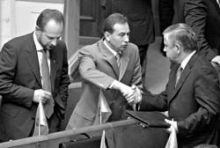It is hard to believe that the coalition is over and Our Ukraine has finally determined its status. On Oct. 4, after consultations with President Yushchenko, Our Ukraine officially announced that it was joining the opposition. “As a consistent political force, we hereby announce our opposition to the current government. We call on the Our Ukraine-affiliated ministers to tender their resignations at the next session of the Cabinet of Ministers,” reads the bloc’s statement.
Many in the anticrisis coalition still find it hard to believe that Our Ukraine has joined the opposition. Speaker Oleksandr Moroz does not believe that “any special events took place on Wednesday,” adding that it was “a regular meeting of representatives of the political forces that analyzed the difficulties of forming a coalition and have not actually stopped this process.”
Prime Minister Viktor Yanukovych regards Our Ukraine’s announcement about joining the opposition as “emotions voiced by certain politicians” and counts on completing the coalition-forming process with the president in the nearest future. In an interview with journalists at the Tashlyk HAES storage plant the prime minister said, “I think that the president and I will have enough energy to cope with the emotions of certain politicians, and that we will complete the process shortly and sign the process concerning the coalition with Our Ukraine. I believe that this issue will be resolved in the next couple of days.”
He noted that so far none of the cabinet members have tendered their resignations. “We haven’t brought up the matter.” Yanukovych’s government includes OU-affiliated Minister of Justice Roman Zvarych; Family, Youth and Sports Minister Yurii Pavlenko; Minister of Health Yurii Poliachenko, and Minister of Culture and Tourism Ihor Likhovy. Among other possible resignations are those by Minister of Internal Affairs Yurii Lutsenko, Minister of Foreign Affairs Borys Tarasiuk, and Minister of Defense Anatolii Hrytsenko, who obtained their portfolios under the president’s quota.
In fact, even the BYuT leader does not believe that the propresidential bloc has finally defined itself. “We talked a little in the lobby and realized that this is not the final decision, that there are certain doubts and possibilities for returning to the governing coalition,” said Yulia Tymoshenko, adding that she would not insist on Our Ukraine signing the existing interfactional alliance agreement if the bloc joins the opposition: “There will be absolutely no conditions imposed on the parliamentarians willing to join the opposition. It’s just that an individual must de facto confirm with his stand, vote, and speeches that he is not putting up with Ukraine being ruled by a mafia.”
It should be noted that the main differences during the talks emerged between Our Ukraine and the Communist Party. Since the communists consider some of the clauses of the Declaration of National Unity to be unacceptable (e.g., NATO, status of the Russian language) and insist that they be deleted from the text), Our Ukraine insisted on including the complete text of the Declaration in the agreement on creating a National Unity Coalition.
Representatives of the Party of Regions insist that the differences between the CPU and the OU were not the only stumbling block on the road to forming a broad coalition. According to the “Blue-and-Whites” there were uncoordinated aspects related to the coalition’s standing orders. Our Ukraine was seeking rights that would allow it to influence the coalition’s decisions and veto them. For obvious reasons the Party of Regions could not accept this.
The negotiations on forming a broad coalition lasted for nearly two months, immediately after the head of state and leaders of the political forces signed the Declaration of National Unity. This document served as the basis for the appointment of the leader of the Party of Regions, Viktor Yanukovych, as prime minister, and the formation of a cabinet including representatives of the OU. Our Ukraine holds 80 out of 450 seats in parliament.
Now the mystery is whether the OU will become a full-fledged member of the so-called interfactional opposition majority formed by the BYuT and two socialists, or whether it will follow its own current.
There is another side of the coin: despite Our Ukraine’s decision to join the opposition, all propresidential MPs willing to do so may join the coalition on an individual basis.
* * *
Our Ukraine intends to initiate an opposition confederation called “European Ukraine,” as announced on Oct. 4 by OU leader Roman Bezsmertny: “We are proposing the initiative to establish the Confederation ‘European Ukraine’ both within and outside parliament, where political forces coordinating opposition activities can unite.”







